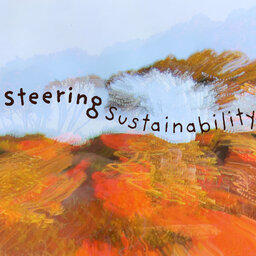
Steering Sustainability
How renewable are renewables? How do we feed 8 billion people? Why is 30% the magic number for protection in protected area management? And how we can adapt to the challenges we face today in sustainable and resilient ways? Welcome to Steering Sustainability, where we explore the questions that need to be asked – and answered – to unlock a better future. Join Professor Melissa Nursey-Bray and Dr…Social links:
Follow the podcast:

How useful is protecting 30% of the planet? With Prof Melissa Nursey-Bray and Dr Ariane Gienger
We are witnessing unprecedented rates of biodiversity loss, with species disappearing at a pace not seen in millions of years, which is posing serious risks to people and the planet. To mitigate those risks, the global community has committed to protecting 30 percent of our lands and waters by 2030…
23:06Clean
How do we avoid green colonialism? With Assoc. Prof. Kristina Sehlin Macneil
Failing to take action on climate change and biodiversity loss is deeply unjust, as those lease responsible for these crises often bear the greatest burden. Yet taking action can be just as unjust if our solutions inadvertently reinforce the very inequalities we are trying to overcome. So how can w…
27:47Clean
How renewable are renewables? With Dr Rachelle Kernen
While there no doubt that transitioning away from fossil fuels is crucial for the future of our planet, it is still important to consider what we are transitioning towards. Wind and sunlight may be renewable and infinite, but can the same be said for the resources that wind turbines and solar panel…
23:44Clean
How do we feed 8 billion people? With Assoc. Prof. Douglas Bardsley
It can be overwhelming to think about feeding eight billion people. But in our current food system, choices in one place can influence lives around the world. So what can we collectively do to make sure that people everywhere have access to fresh and healthy food? In this episode, we talk to Assoc…
27:14Clean
How do we engage the disengaged? With Dr Scott Hanson-Easey
We know climate action is crucial, yet so many of us struggle to live fully sustainable lives. But does it really matter how much we, as individuals, engage in climate action? Who is ultimately responsible for addressing global challenges like climate change? Melissa and Ariane sit down with Dr Sc…
25:26Clean
 Steering Sustainability
Steering Sustainability